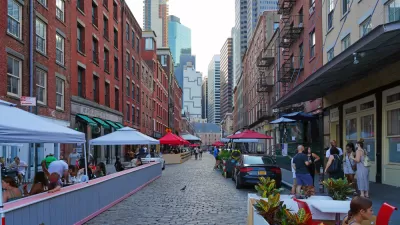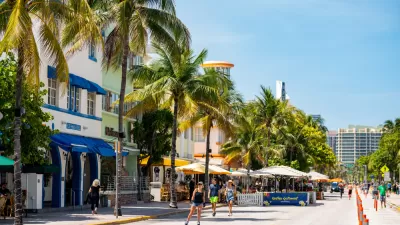Miami Beach reopened Ocean Drive to vehicles earlier this year at the request of hotel owners. So many pedestrians showed up to the famous street on a weekend earlier this month, however, that cars were blocked once again.

"Ocean Drive was 'organically' closed to car traffic over the weekend – forced by throngs of pedestrians crowded into the area," according to an article published by Next Miami on March 23.
The news of the street closure was first reported on the Twitter feed of Better Streets Miami Beach, a local active transportation advocacy group.
Ocean Drive was closed to automobile traffic in 2020 while cities all over the country and world were deploying open streets (or Al Fresco Streets) as a response to the lockdowns and relative lack of automobile travel during the first months of the pandemic.
Fast forward to 2022, and Miami Beach started allowing automobile traffic back onto Ocean Drive on January 24, 2022. It wasn't the first time the city tried to allow cars back onto the drag—they made a similar move around the 4th of July holiday in 2020—but he 2022 decision to reopen the street to automobiles followed a bitter battle, including a lawsuit, between local residents and hotel owners along the street. The Miami Herald reported on the legal controversy in a paywalled article published in January. A plan to permanently pedestrianize the street produced some beautiful renderings, but hasn't yet won the day.
FULL STORY: Pedestrians ‘Organically’ Take Back Ocean Drive After Commissioners Reopen It To Car Traffic

Planetizen Federal Action Tracker
A weekly monitor of how Trump’s orders and actions are impacting planners and planning in America.

Maui's Vacation Rental Debate Turns Ugly
Verbal attacks, misinformation campaigns and fistfights plague a high-stakes debate to convert thousands of vacation rentals into long-term housing.

Restaurant Patios Were a Pandemic Win — Why Were They so Hard to Keep?
Social distancing requirements and changes in travel patterns prompted cities to pilot new uses for street and sidewalk space. Then it got complicated.

In California Battle of Housing vs. Environment, Housing Just Won
A new state law significantly limits the power of CEQA, an environmental review law that served as a powerful tool for blocking new development.

Boulder Eliminates Parking Minimums Citywide
Officials estimate the cost of building a single underground parking space at up to $100,000.

Orange County, Florida Adopts Largest US “Sprawl Repair” Code
The ‘Orange Code’ seeks to rectify decades of sprawl-inducing, car-oriented development.
Urban Design for Planners 1: Software Tools
This six-course series explores essential urban design concepts using open source software and equips planners with the tools they need to participate fully in the urban design process.
Planning for Universal Design
Learn the tools for implementing Universal Design in planning regulations.
Heyer Gruel & Associates PA
JM Goldson LLC
Custer County Colorado
City of Camden Redevelopment Agency
City of Astoria
Transportation Research & Education Center (TREC) at Portland State University
Jefferson Parish Government
Camden Redevelopment Agency
City of Claremont





























